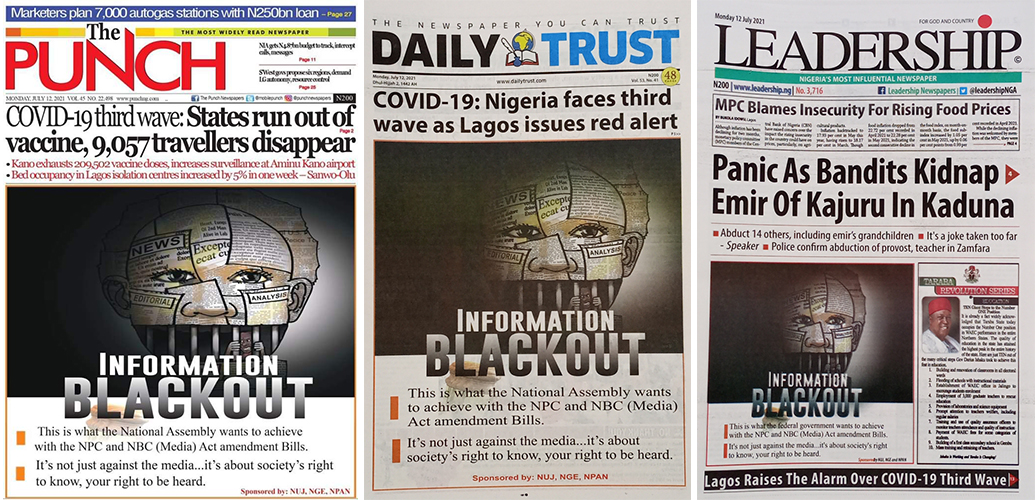The government’s attempt to regulate the media is only the latest in a series of failed attempts to do so.
The front banners of major newspapers in Nigeria on Monday bore a picture of an individual with a sealed mouth.
“Information Blackout,” read the caption that ran with the picture. “It’s not just against the media….it’s about society’s right to know, your right to be heard.”
The message is a joint release from the Nigeria Union of Journalists (NUJ), Nigerian Guild of Editors (NGE) and Newspaper Proprietors’ Association of Nigeria (NPAN).
It is expected to be the chyron on television stations, the jingles on radio stations and the lead graphics on online media.
This is a pushback by media organisations in the country against the Buhari government’s brazen attempt to regulate social media and censor the press through controversial media bills at the National Assembly.
The controversial bills are the Nigerian Broadcasting Commission (NBC) and the Nigerian Press Council (NPC) Act amendment bills.
The former sought lawmakers’ cooperation to include “all online media” among the media organisations the government seeks to be able to censor.
Existing censorship on broadcast stations persists, and instances, where the stations are ordered to stop the broadcast of programmes the government feels uncomfortable with, are rife. Heavy fines are imposed at will when there is an alleged breach.
The latter gives the president the right to appoint the chairman of the board of the Nigerian Press Council (NPC). It also empowers the president to appoint all other members of the board upon the recommendation of the information minister.
“I stand resolutely by the NUJ, NGE and NPAN in its campaign against information blackout as represented by the NPC and NBC (Media) Act amendment Bills,” a former vice president, Atiku Abubakar, wrote on Facebook Monday evening. “Freedom of the press and access to information is the oxygen of democracy and must never be compromised.”
Attempts At Stifling Free Speech
Since coming to office, the Buhari administration has made clear its preference for controlling, or possibly, silencing the media. Mr Mohammed, a lawyer and former spokesperson for the ruling All Progressives Congress, has led the effort to actualise that mandate.
Mr Buhari ran a repressive military dictatorship in the early 1980s and his government jailed journalists and critics, and enacted draconian anti-press decrees.
As a candidate seeking to return a civilian president, Mr Buhari claimed he had become a “reformed democrat”.
His government’s initial attempts to regulate social media through a bill at the National Assembly fell flat largely due to public backlash. The government has now clawed back its resolve through the newly introduced controversial media bills.
Mr Mohammed says it is the practice across the world. However, PREMIUM TIMES has shown his narrative is flawed as most of the countries Nigeria seeks to emulate are ranked poorly in the press freedom and on the human development index.
In June, the government banned Twitter after the social media platform deleted President Buhari’s post, and threatened to prosecute Nigerians who continued with its use. The administration has refused to reverse the decision despite public backlash and international condemnations. It, however, later admitted it lacked the legal backing to go after Twitter users.
Rights groups and activists have criticised the government’s move to regulate the media and have demanded greater transparency in government.
“The National Assembly should not enact any law that will deny press freedom,” the executive director of the International Press Centre, Lanre Arogundade, told PREMIUM TIMES in June.
“The public should know that an assault on the media is an assault on them. It’s not a media battle alone, it is for everyone,” Mr Arogundade added.
A coalition of civil society organisations including Amnesty International and the Centre for Democracy and Development (CDD) also lashed at the bills in a recent statement.
“The Nigerian authorities have continued to propose laws to regulate the social media, and restrict the rights to freedom of expression, access to information, and media freedom, including through legislative bills popularly known as the ‘Hate Speech Bill’ and ‘The Social Media Bill’ which both provide severe punitive sanctions such as the death penalty in some cases, for social media users convicted of ‘crimes’ provided under them.”
– Premium Times











No comments:
Post a Comment